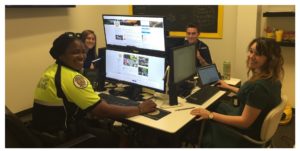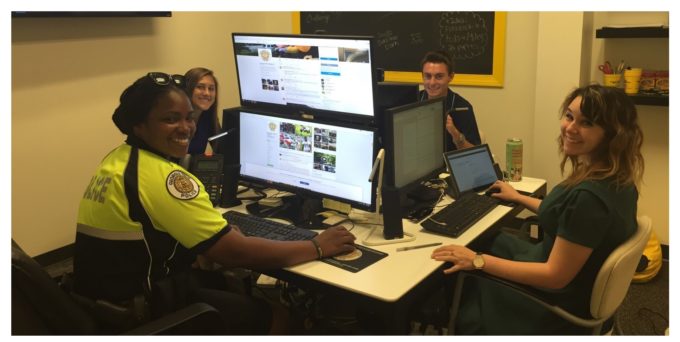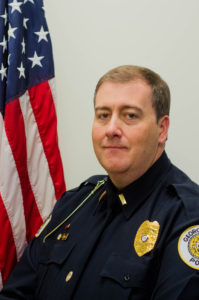By: Lt. Tony Leonard, Georgia Tech Police Department
Summary: Most law enforcement agencies are now using social media, but many haven’t clearly defined their goals for what they want to accomplish with social media. In this article, Lt. Tony Leonard offers some tips, tactics and techniques.

Clockwise from right: social media reporter Cameron Garcia, Officer Jessica Howard, social media reporter Tyler Bennett, and social media reporter Cody Schoenfuss.
Most of us wouldn’t think of taking to the road and sitting in traffic without somewhere specific we plan to end up. When you get behind the wheel of your car each day, you begin with a firm idea of where you want to go. Starting with your destination in mind allows you to GPS directions, plan routes, and determine an estimated time it will take to get to where you are going.
Do you do the same thing with your social media program?
Most agencies have established some sort of presence on social media by now. However, I was very surprised recently to find that most agencies don’t set clearly defined goals for what they want to accomplish with their social media program.
Odds are good your department has clearly defined goals for what the agency wants to accomplish in general. Most departments also engage in strategic planning each year, setting specific annual goals, and then mapping out the steps needed to achieve them. Done correctly, these goals are measurable and realistic, providing the entire agency with a clear idea of where the chief or sheriff is taking the organization, which allows everyone to focus their energies in the same direction.
A successful social media program is no different. It’s great to have a presence on Facebook or Twitter, or post cool pics on Instagram, but what’s the overall purpose of it? What is your agency trying to accomplish, and why should it devote personnel, resources, or money to the effort?
Whether you’re starting a new social media program for your agency, or reevaluating an existing one, it’s never too late to set some goals, to define what you want to accomplish, and establish some measurable standards to see if you achieve it.
Ask yourself:
- What do we want to accomplish with our program? Outreach and improved community relationships? Humanizing the police? Dissemination of public information?
- What do we do with our social media? Do we monitor for threats or gather intelligence? Do we use social media for investigations? Is our social media program primarily for community outreach and/or public information?
- What do we want to measure? What does “success” look like? Is it the number of followers? Is it engagement or click-through rate? How do we measure improved community relations?
The answers to these questions form the basis of your goals.
Goals should be created with as many stakeholders involved as possible, since part of their purpose is to put everyone on the same page, to get the entire team pulling in the same direction. Make sure the goals are measurable, and decide while you are writing the goals what standards you will use to measure the results.
For example, avoid vague goal statements such as, “Improve our social media content”. How do you know if you have improved it or not? A better goal might be, “Increase the number of followers of our social media accounts”, or, “Increase interaction/engagement with our followers”. This works for two reasons. First, if you actually improve your content, engagement should increase, as will the number of people that follow you. Second, both statements establish how you will measure success. Each of them is clear, quantifiable, and achievable.
After you have some measurable goals, establish some realistic action steps for achieving them. For example, if your goal is to increase the number of your followers on social media, your action steps might look like this:
- Establish a baseline number of current followers on each platform
- “Real-world” marketing:
- T-shirts (or other branded giveaways that say “Follow us @…)
- Presence at community events
- At least two live videos/month (live video is great for gathering attention and new followers)
- Two or more interactive online events per month (caption contests, giveaways, Facebook Live, Ask Me Anything, live interviews, etc.)
The actions you choose depend on what you want to accomplish and your own imagination. Keep your goals realistic, measurable, and achievable.
Regardless of what kind of social media program your agency has, large or small, setting measurable goals will help set your priorities and focus your energies. You’ll not only be more successful, you’ll also have the numbers to prove your success.
About the author: Lt. Tony Leonard is Training Coordinator for the Georgia Tech Police Department, where he also supervises the Social Media Center. Tony retired as a Captain after 20 years with the Smyrna, GA Police Department. Since 1998, Tony has been an adjunct instructor at three police academies. He has provided computer investigations training nationwide through the National Criminal Justice Training Center since 2008. He has been a guest college lecturer, and often speaks at state and national conferences. Tony is certified as a Master Instructor.
In 2012, Tony participated in the Georgia International Law Enforcement Exchange’s 20th Delegation to Israel, where he studied law enforcement techniques with the Israel Police. He is also a graduate of the 130th Administrative Officer’s Course of the Southern Police Institute at the University of Louisville.



